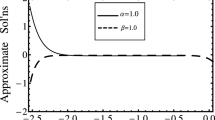Abstract
In the present paper, the fractional Burger’s equation is considered in the \((n+1)\)-dimension with a nonlinear analytic term where the derivatives are Caputo fractional derivatives. An approximate analytical solution is obtained using the homotopy perturbation method. The concept is illustrated with examples.
Similar content being viewed by others
Data Availability
Not applicable.
References
Miller, K.S., Ross, B.: An Introdution to the fractional calculus and fractional differential equations. J. Willey & Sons, New York (1993)
Kilbas, A.A., Srivastava, H.M., Trujillo, J.J.: Theory and applications of fractional differential equations, vol. 204. Elsevier North-Holland Science Publishers, Amsterdam (2006)
Podlubny, I.: Fractional differential equations. Academic Press, San Diego (1999)
Turkyilmazoglu, M.: An efficient computational method for differential equations of fractional type, computer modelling in engineering and science, online first. https://doi.org/10.32604/cmes.2022.020781.
Turkyilmazoglu, M.: Nonlinear problems via a convergence accelerated decomposition method of adomian, computer modelling in engineering and science, online first. https://doi.org/10.32604/cmes.2021.012595.
Turkyilmazoglu, M.: Is homotopy perturbation method the traditional Taylor series expansion. Hacet. J. Math. Stat 44(3), 651–657 (2015)
Shiri, B., Kong, H., Wu, G.-C., Luo, C.: Adaptive learning neural network method for solving time-fractional diffusion equations. Neural Comput. 34(4), 971–990 (2022)
Baleanu, D., Shiri, B.: Nonlinear higher order fractional terminal value problems. AIMS Math. 7(5), 7489–7506 (2022)
Gu, C.-Y., Wu, G.-C., Shiri, B.: An inverse problem approach to determine possible memory length of fractional differential equations. Fract. Calc. Appl. Anal. 24, 1919–1936 (2021)
Yang, G., Shiri, B., Kong, H., Wu, G.-C.: Intermediate value problems for fractional differential equations. Comput. Appl. Math. 40(195), 20 (2021)
Gu, C.-Y., Shiri, B., Baleanu, D.: Terminal value problems for the nonlinear systems of fractional differential equations. Appl. Numer. Math. 170, 162–178 (2021)
Hussain, A.K., Fadhel, F.S., Rusli, N., Yahya, Z.R.: On the existence and uniqueness of solutions of fractional order partial integro-differential equations. Far. East J. 102(1), 121–136 (2017)
Bateman, H.: Some recent researches on the motion of fluids. Mon. Weather Rev. 43(4), 163–170 (1915)
Burgers, J.M.: A mathematical model illustrating the theory of turbulence. Adv. Appl. Mech. Elsevier 1, 171–199 (1948)
Bendaas, S.: Periodic wave shock solutions of Burgers equations. Cogent Math. Stat. 5(1), 1463597 (2017)
Sugimoto, N.: Burgers equation with a fractional derivative; hereditary effects on nonlinear acoustic waves. J. Fluid Mech. 225, 631–653 (1991)
Sripacharasakullert, P., Sawangtong, W., Sawangtong, P.: An approximate analytical solution of the fractional multi-dimensional Burgers equation by the homotopy perturbation method, advances in difference equations. Artic. ID 252, 12 (2019)
He, J.H.: Homotopy perturbation technique, computer methods. Appl. Mech. Eng. 178, 257–262 (1999)
He, J.H.: PerturbationPerturbation methods: basic and beyond. Elsevier, Amsterdam (2006)
He, J.H.: Application of homotopy perturbation method to nonlinear wave equations. Chaos Solitons Fractals 26, 695–700 (2005)
Elbeleze, A.A., Kilicman, A., Taib, B.M.: Note on the convergence analysis of homotopy perturbation method for fractional partial differential equations. Artic. ID 803902, 8 (2014)
Kilicman, A., Shokhanda, R., Goswami, P.: On the solution of (n+1)-dimensional fractional M-Burgers equation. Alex. Eng. J. 60(1), 1165–1172 (2020). https://doi.org/10.1016/j.aej.2020.10.040
Acknowledgements
Authors are thankful to reviewer for their very constructive comments.
Funding
There is no funding.
Author information
Authors and Affiliations
Contributions
Both authors contributed equally to the article.
Corresponding author
Ethics declarations
Conflict of interest
There is conflict of interest.
Additional information
Publisher's Note
Springer Nature remains neutral with regard to jurisdictional claims in published maps and institutional affiliations.
Rights and permissions
Springer Nature or its licensor holds exclusive rights to this article under a publishing agreement with the author(s) or other rightsholder(s); author self-archiving of the accepted manuscript version of this article is solely governed by the terms of such publishing agreement and applicable law.
About this article
Cite this article
Shokhanda, R., Goswami, P. Solution of Generalized Fractional Burgers Equation with a Nonlinear Term. Int. J. Appl. Comput. Math 8, 235 (2022). https://doi.org/10.1007/s40819-022-01449-4
Accepted:
Published:
DOI: https://doi.org/10.1007/s40819-022-01449-4
Keywords
- Banach fixed point theorem
- Fractional Burger’s equation
- Caputo fractional derivative
- Riemann-Liouville fractional integral
- Homotopy perturbation method




